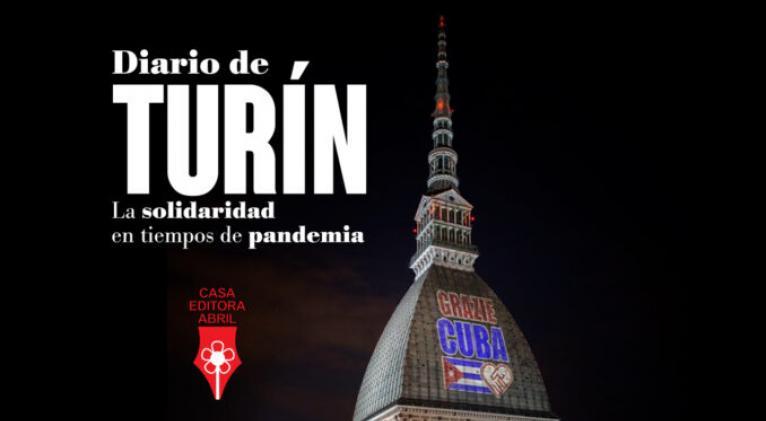Like a great journalist, writer, Enrique Ubieta Gómez (Havana, 1958), has written a testimonial book, Diario de Turín. La solidaridad en tiempos de pandemia, which not limits to narrate his experience with the Cuban medical brigade Henry Reeve for several months in Italy in 2020, but also“focuses on hospitable universe to open perspectives towards fuller horizons,” according to the words of Graziella Pogolotti in the preface.
We read an inspiring text showing the struggle against tragedy brought by the pandemic in that region, and the sacrifice of health workers from an underdeveloped nation despite being blocked by the Yankee’s malice. They came here risking their own life for people they do not even know in a first-world country, so hurt by the moral underdevelopment in a very unjust society.
Ubieta digs deeper. His prose is adorned by a lyric addressing the daily epic, with danger always present and the essential analysis, not letting the heat of the song or the coldness of the studio burn. He goes beyond what is happening: his steps go further and lead to what was happening before.
He brings us closer to protagonists who talk about their personal stories, even family ones, most of them with so many missions of this kind in their record. They just do it: plain and simple: they are heroes but they do not boast about it. They see it as normal in the common Cuba, sculpted by a superior system, despite flaws. Enrique makes the most out of that invigorating modesty of the greatness of the group.
There are also the feelings and interesting stories from the lives of patients, the medical staff, the volunteers and not a few officials from Italy. They do not sing red poems: they offer the synthesized feeling, in two words: Thank you! These fights against death in both Crema and Turin have contributed a lot to break down the lies and the exaggerated use of our failures from the poisonous right approach. And although the brigade came to save lives and not to do politics, facts say much more than words and confirm the truth.
The author —magnificent witness— has been involved first-person in the fight: he is member 38 of the medical brigade in Turin. And he is not a rookie in this field. He is a heartfelt follower of Marti, Fidel and he follows what the Apostle said: “I do not believe the writer should stand before his public to boast about his power, but to provide, in a proper way, the largest number of ideas.”
Ubieta appears when he is essential and does not hide his emotion without being attached to it, leaving his thoughts adrift. He knows how to break, when it is convenient, with the internalization of the characters, real in his case, and the poetics of the events. And like Martí, he knows how to thread moments that allow him to merge traditions, stories, legends, pains, disputes, parts of speeches or documents, figures, feelings... to invigorate the literary work.
Given the current political situation in Italy, this paragraph at the end of the introduction to Diario…: "The country that millions of tourists visit and it is known for its history, its ancient palaces, its churches, its legendary cities, was only possible through its inhabitants, the volunteers who accompanied us, the doctors and nurses, the patients... But it was, perhaps, the best way to get closer to it. Knowing Italy is a greater purpose that goes beyond our brief stay in one of its main cities. This book does not describe Italy, although our love for that country is expressed here. If we went to give our solidarity, we also received it. I hope Italy does not forget what that nation learned in these months of confinement and meditation; what it did wrong, what it should and can do right.”


Deje un comentario